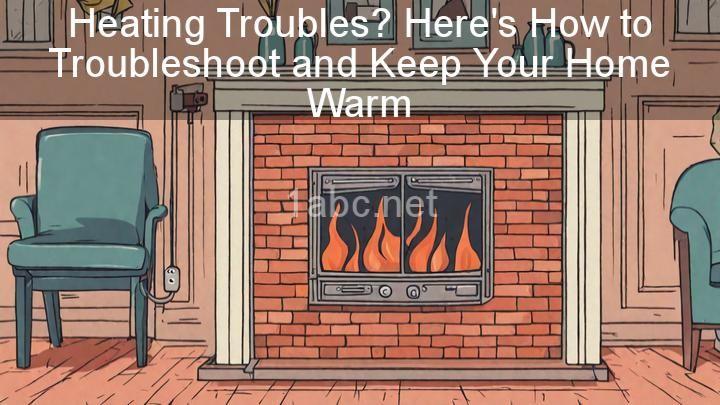Heating Troubles? Here's How to Troubleshoot and Keep Your Home Warm

Introduction:
Welcome readers! We understand how frustrating it can be to experience heating troubles, especially during the colder months when all we want is a warm and comfortable home. In this blog post, we will guide you through common heating issues, provide DIY troubleshooting tips, and share regular maintenance tips to help you keep your home cozy and warm.
I. Understanding Common Heating Issues:
Before we dive into troubleshooting, let's take a moment to understand the common heating problems that homeowners may encounter. These issues can include uneven heating, no heat, or strange noises coming from the heating system. It's important to remember that troubleshooting is often the first step in resolving these problems.
II. DIY Troubleshooting Tips:
A. Uneven Heating:
One of the most common heating issues is uneven heating, where certain areas of your home may be warmer or cooler than others. To troubleshoot this problem, check air vents and registers for any obstructions. Sometimes furniture or curtains can block the airflow, so it's essential to ensure that nothing is impeding the heat distribution. If you have dampers in your HVAC system, consider adjusting them to balance the airflow throughout your home.
B. No Heat:
If you're experiencing no heat at all, there are a few things you can check before calling a professional. First, verify that your thermostat is set to "heat" and at an appropriate temperature. It sounds simple, but sometimes the thermostat settings can get accidentally changed, resulting in no heat. Next, check the circuit breaker or fuse box to ensure there is power supply to your heating system. If the breaker has tripped or a fuse has blown, resetting or replacing them may solve the problem. Lastly, inspect your air filters and replace them if they are dirty. A clogged air filter can restrict airflow and prevent warm air from circulating properly.
C. Strange Noises:
Strange noises coming from your heating system can be quite alarming. Different types of noises can indicate various issues. For example, rattling noises may suggest loose parts, such as screws or panels. Banging noises can indicate a problem with the ignition or burners. Whistling noises might be due to air leaks or a malfunctioning blower motor. If you're comfortable doing so, check for any loose parts and tighten them. However, if you're unsure or the noise persists, it's best to contact a professional to diagnose and resolve the issue.
III. Regular Maintenance Tips:
To prevent and minimize heating issues, regular maintenance is crucial. Consider implementing the following tips into your maintenance routine:
A. Cleaning and Dusting:
Regular cleaning and dusting are important to maintain optimal heating performance. Dusting vents, registers, and radiators on a regular basis can prevent blockages and ensure efficient heat distribution throughout your home. Neglecting this simple task can lead to reduced airflow and uneven heating.
B. Air Filter Replacement:
Air filters play a vital role in maintaining good indoor air quality and efficient heating. Over time, air filters can become clogged with dust, debris, and other particles, which can hinder airflow and reduce the efficiency of your heating system. It's recommended to replace air filters every few months or as recommended by the manufacturers. This simple step can help your heating system run smoothly and efficiently.
C. Professional Maintenance:
While DIY maintenance is beneficial, it's equally important to schedule annual professional inspections and maintenance. Professional technicians have the expertise to detect potential issues and perform necessary repairs or adjustments before they turn into major heating problems. By investing in regular professional maintenance, you can save yourself from unexpected breakdowns and costly repairs in the long run.
Conclusion:
By understanding common heating issues, following DIY troubleshooting tips, and implementing regular maintenance, you can keep your home warm and cozy throughout the colder months. Remember, if you have any concerns or doubts about handling your heating system, it's always best to consult a professional. They have the knowledge and experience to address any complex issues and ensure your heating system is functioning optimally. Stay warm, and enjoy the comfort of your cozy home!
FREQUENTLY ASKED QUESTIONS
Why is my heating system not producing enough heat?
There can be several reasons why your heating system is not producing enough heat. Here are a few possible causes:
- Thermostat settings: Ensure that your thermostat is set to the desired temperature and in the heating mode. If the thermostat settings are incorrect, it may prevent the system from generating sufficient heat.
- Airflow issues: Check for any obstructions or blockages in the vents, ducts, or filters. Restricted airflow can reduce the effectiveness of your heating system.
- Insufficient insulation: Poor insulation in your home can lead to heat loss, making it harder for your heating system to maintain a comfortable temperature.
- Dirty or malfunctioning components: Dirty or faulty components, such as the air filter, blower motor, or heat exchanger, can impact the efficiency of your heating system.
- Fuel supply problems: If you have a furnace that runs on fuel (such as gas or oil), verify that you have an adequate and uninterrupted supply.
In some cases, it may be necessary to seek professional assistance from an HVAC technician to diagnose and resolve the issue with your heating system.
What should I do if my heater is blowing cold air?
If your heater is blowing cold air, there are a few things you can check and potentially do to resolve the issue:
- Check the thermostat settings: Ensure that the thermostat is set to the desired temperature and heating mode. Make sure it is set to "heat" instead of "cool" or "fan" mode.
- Check the air filter: A dirty or clogged air filter can restrict airflow and prevent warm air from circulating properly. Check the filter and clean or replace it if necessary.
- Verify the pilot light or ignition system: If you have a gas heater, check to see if the pilot light is lit. If it's not, follow the manufacturer's instructions to relight it. If you have an electric heater, check that the ignition system is functioning properly.
- Inspect the thermostat batteries: If your thermostat uses batteries, check if they need to be replaced. Low battery power can cause heating issues.
- Check the circuit breaker: Make sure the circuit breaker for your heater hasn't tripped. Sometimes a power surge or electrical issue can cause the breaker to trip, cutting off power to the heater.
- Check the ductwork: Inspect the ductwork for any leaks or disconnected sections. Leaky ducts can cause heat loss and prevent warm air from reaching the rooms effectively.
If none of these steps resolve the issue or you are unsure how to proceed, it's best to contact a professional HVAC technician to diagnose and fix the problem.
Why is my heating system making strange noises?
There could be several reasons why your heating system is making strange noises. Here are a few common possibilities:
- Air in the system: The presence of air bubbles in the pipes or radiators can cause gurgling or ticking noises. Bleeding the system to remove trapped air might solve the issue.
- Loose components: Over time, some components such as screws, bolts, or fan blades may become loose, leading to vibrations and rattling noises. Tightening or replacing these components can fix the problem.
- Clogged or faulty heat exchanger: A heat exchanger that is clogged with dirt or debris can cause banging or popping sounds when it expands and contracts due to temperature changes. Cleaning the heat exchanger or, in some cases, replacing it might be necessary.
- Ductwork issues: If there are loose or damaged sections of ductwork, you may hear whistling or rattling noises. Inspecting and repairing the ductwork can help resolve this.
- Ignition problems: If you have a gas furnace, clicking or booming noises during ignition could indicate an issue with the pilot light or ignition system. It's best to contact a professional to diagnose and repair this.
It's important to remember that while some heating system noises can be harmless, others can indicate a mechanical problem. If the strange noises persist or worsen, it is recommended to consult a qualified HVAC technician to diagnose and address the issue.
How can I improve the efficiency of my heating system?
There are several ways you can improve the efficiency of your heating system:
- Upgrade your insulation: Improving the insulation in your home can greatly reduce heat loss and help your heating system work more efficiently. Add insulation to your walls, attic, and basement if necessary.
- Seal air leaks: Air leaks around windows, doors, and other openings can cause drafts and make your heating system work harder. Weatherstripping and caulking can help seal these leaks and improve efficiency.
- Maintain your heating system: Regular maintenance, such as cleaning or replacing filters, can help your heating system operate at its best. Schedule annual professional maintenance to ensure your system is running efficiently.
- Install a programmable thermostat: A programmable thermostat allows you to set different temperatures for different times of the day, so you can lower the temperature when you're away or asleep. This can help save energy and improve efficiency.
- Use zoning: If possible, install a zoning system that allows you to control the temperature in different areas of your home independently. This way, you can heat only the areas that need it, avoiding wasted energy.
- Upgrade to a high-efficiency system: If your current heating system is old and inefficient, consider upgrading to a newer, high-efficiency model. Look for an ENERGY STAR certified system, which meets specific efficiency standards.
- Consider alternative heating sources: Depending on your location and climate, you may want to explore alternative heating sources like solar thermal systems or geothermal heat pumps. These can be more energy-efficient and environmentally friendly options.
Remember, it's always a good idea to consult with a professional HVAC technician to assess your specific situation and provide tailored recommendations for improving the efficiency of your heating system.
